2017 SkS Weekly Climate Change & Global Warming Digest #6
Posted on 12 February 2017 by John Hartz
Story of the Week... La Niña Update... Toon of the Week... Quote of the Week... Graphic of the Week... SkS in the News... Photo of the Week... SkS Spotlights... Video of the Week... Coming Soon on SkS... Poster of the Week... Climate Feedback Reviews... SkS Week in Review... 97 Hours of Consensus...
Story of the Week...
Humans causing climate to change 170 times faster than natural forces
Researchers behind ‘Anthropocene equation’ say impact of people’s intense activity on Earth far exceeds that of natural events spread across millennia
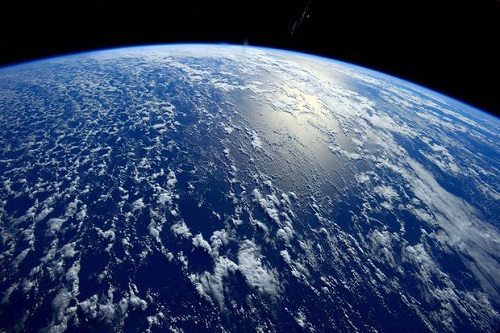
Photograph: ISS/NASA
For the first time, researchers have developed a mathematical equation to describe the impact of human activity on the earth, finding people are causing the climate to change 170 times faster than natural forces.
The equation was developed in conjunction with Professor Will Steffen, a climate change expert and researcher at the Australian National University, and was published in the journal The Anthropocene Review.
The authors of the paper wrote that for the past 4.5bn years astronomical and geophysical factors have been the dominating influences on the Earth system. The Earth system is defined by the researchers as the biosphere, including interactions and feedbacks with the atmosphere, hydrosphere, cryosphere and upper lithosphere.
But over the past six decades human forces “have driven exceptionally rapid rates of change in the Earth system,” the authors wrote, giving rise to a period known as the Anthropocene.
“Human activities now rival the great forces of nature in driving changes to the Earth system,” the paper said.
Steffen and his co-researcher, Owen Gaffney, from the Stockholm Resilience Centre, came up with an “Anthropocene Equation” to determine the impact of this period of intense human activity on the earth
Humans causing climate to change 170 times faster than natural forces by Melissa Davey, Guardian, Feb 12, 2017
Journal reference: The Anthropocene Review, doi: 10.1177/2053019616688022
Also see:
Simple equation shows how human activity is trashing the planet by Owen Gaffney, New Scientist, Feb 10, 2017
La Niña Update...
Well, that was quick! The ocean surface in the tropical Pacific is close to average for this time of year, putting an end to La Niña, and forecasters expect that it will hover around average for a few months. Let’s dig in to what happened during January, and what the forecast looks like.
February 2017 ENSO update: bye-bye, La Niña! by Emily Becker, NOAA's Climate.gov, Feb 9, 2017
Toon of the Week...
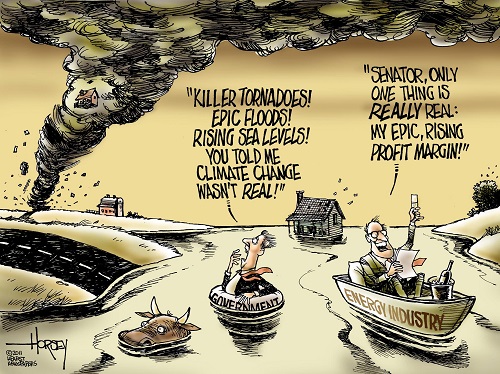
Quote of the Week...
As Gavin Schmidt, Director of the Goddard Institute for Space Studies and Principal Investigator for the GISS ModelE Earth System Model, put it, “In science, nothing is ever known perfectly. Is there remaining uncertainty in the exact value of gravity? Yes. But to something like the fourth decimal place. It doesn’t matter. So the question is: Is the remaining uncertainty relevant to any policy decision anyone would want to make? And the answer is: no.”
How the New Climate Denial Is Like the Old Climate Denial: Both are excuses for inaction. by Meehan Crist, The Atlantic, Feb 10, 2017
Graphic of the Week...
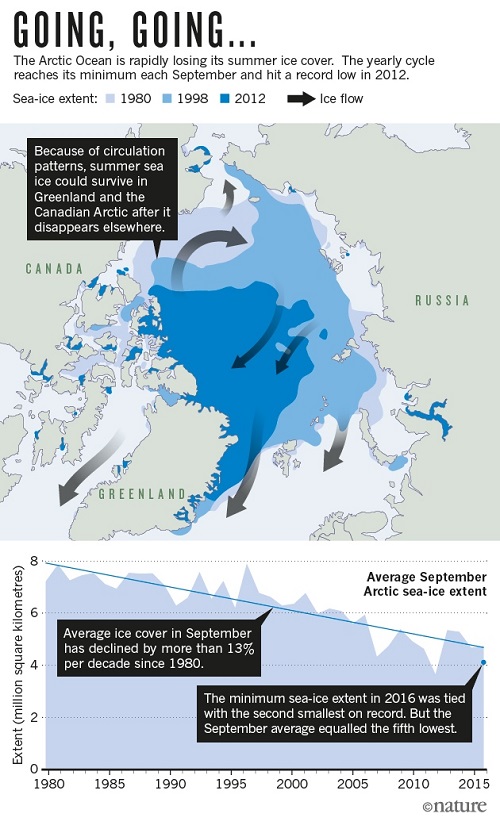
Arctic 2.0: What happens after all the ice goes? by Julia Rosen, Nature, Feb 8, 2017
SkS in the News...
John Cook's article, What do gorilla suits and blowfish fallacies have to do with climate change? originally published in the Conversation US has been reposted on a number of news sites including: SFGate,
Photo of the Week...
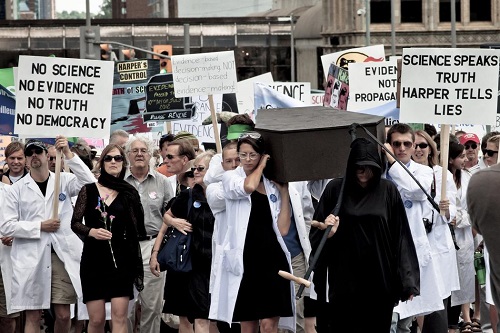
From the "Death of Evidence" rally in Ottawa, 2012. All images by Richard Webster
Canada’s Censored Scientists Are Helping American Researchers Resist Trump by Stephen Buranyi, Motherboard, Feb 9, 2017
SkS Spotlights...
The Stockholm Resilience Centre is an international research centre at Stockholm University that focuses on the resilience of social-ecological systems.
The centre is a transdisciplinary initiative between Stockholm University and the Beijer International Institute of Ecological Economics at The Royal Swedish Academy of Sciences. It also offers a Masters programmes on social-ecological resilience and has its own PhD Research school.
Research at the Stockholm Resilience Centre is transdisciplinary but organized within the following areas:
- Adaptive governance, knowledge generation and social networks studies how the different aspects of governance and knowledge groups interact to provide resilience against global challenges.
- Governance of marine systems aims to secure the oceans' ability to continue to provide ecosystem services.
- Governing freshwater works on ways to improve freshwater green water and blue water flows.
- Regime shifts focuses on sudden and often dramatic changes in social-ecological systems and the subsequent reorganization
- Global and cross-level dynamics studies the interactions between human activities and Earth's environment, particularly how local and regional drivers can generate global-scale changes
- Urban social-ecological systems studies the challenges posed by urbanization and the transformation of rural, peri-urban and urban landscapes.
Source: Wikipedia
Video of the Week...
NOAA vs Mail on Sunday — FACT CHECK, potholer54, YouTube, Feb 9, 2017
Coming Soon on SkS...
- Why claiming that climate scientists are in it for the money is absurd (Baerbel)
- Trump can save his presidency by saving the climate (Dana)
- Loyola's ignorance in Forbes (Sarah)
- Guest Post (John Abraham)
- Elevator Pitches - Chapter 01 - Ancient Sunlight (Rob Honeycutt)
- 2017 SkS Weekly Climate Change & Global Warming News Roundup #7 (John Hartz)
- 2017 SkS Weekly Climate Change & Global Waming Digest #7 (John Hartz)
Poster of the Week...
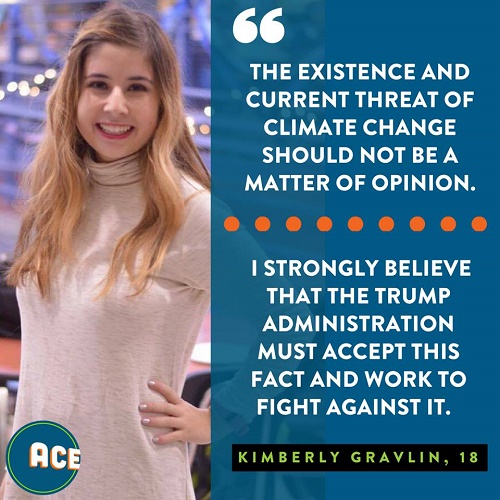
Alliance for Climate Education
Climate Feedback Reviews...
Climate Feedback asked its network of scientists to review the article, The big melt: Global sea ice at record low by Doyle Rice, USA Today, Feb 8, 2017
Twelve scientists analyzed the article and estimated its overall scientific credibility to be ‘very high’.
Click here to access the detailed review.
SkS Week in Review...
- 2017 SkS Weekly Climate Change & Global Warming News Roundup #6 by John Hartz
- What do gorilla suits and blowfish fallacies have to do with climate change? by John Cook (The Conversation US)
- Whistleblower: ‘I knew people would misuse this.’ They did - to attack climate science by Dana Nuccitelli (Climate Consensus -the 97%, Guardian)
- Correcting Warren Meyer on Forbes by Rob Honeycutt
- Mail on Sunday launches the first salvo in the latest war against climate scientists by John Abraham (Climate Consensus -the 97%, Guardian)
- Repeal without replace: a dangerous GOP strategy on Obamacare and climate by Dana Nuccitelli (Climate Consensus -the 97%, Guardian)
- 2017 SkS Weekly Climate Change & Global Warming Digest #5 by John Hartz
97 Hours of Consensus...
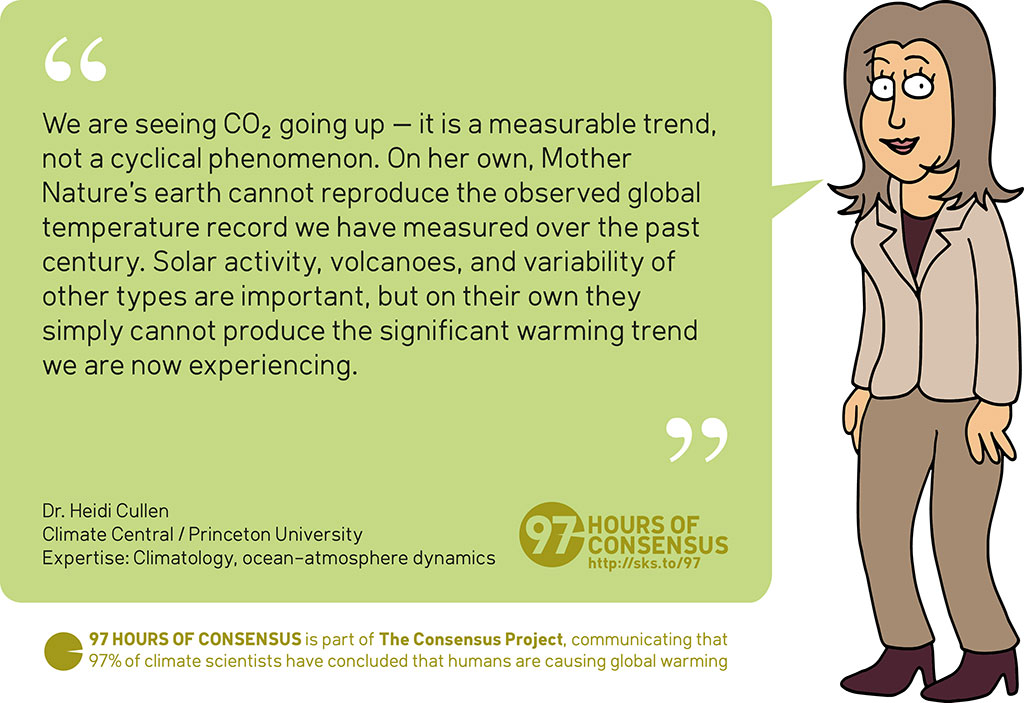































 Arguments
Arguments






























Sorry if this question is a bit convoluted - I came to ask a question about the current state of the arctic - from my layman's POV sometime in early Nov. the dome of cold air that was on top of the world fell off and landed on Eurasia, where they experienced weather -20 C below normal for weeks while in the arctic it was almost the opposite with temps upwards of +20 C above normal - temps as I write are 32-34 C above normal in the arctic and most of Eurasia is still under the influence of that cold weather that arrived in late fall of 2016 - as the remnants of this dome get warmed up with the coming of spring and summer and the arctic already far warmer than normal will see the sun and what's left of the ice starts a melt, so we're seemingly very close to that ice-free arctic summer - will it ever be as cold in the arctic as it once was? - is that dome of cold air falling on Russian and Europe a climate tipping point event?
knox kp @1, I am not well read in this area, but climate models appear to indicate that there is no tipping point associated with the Arctic becoming sea ice free in summer. Certainly that is the conclusion of Winton (2006), Eisenman and Wetlaufer (2008), and Teitsche et al (2011). In Winton (2006), however, one of two models showed a tipping point when the Arctic was sea ice free earlier in the season, which was also shown by Eisenman and Wetlaufer (2008). Eisenman and Wetlaufer indicate that this is because, in September, the time of the summer sea ice minimum, solar radiation is already very low, and indeed, of similar value to the March "winter" sea ice maximum. In essence, as sea ice free conditions occur earlier in the year, you get low albedo conditions with stronger radiation. At some point, requiring sea ice free conditions earlier than June according to Eisenman and Wetlaufer, sufficient radiation is absorbed over the summer that the sea ice does not refreeze on the following winter, at which point reduction to the same global mean surface temperature will not restore sea ice (although at some point below it, it will).
I note again that I am not well read on this topic, so other papers may have different results - but these are the three papers I have read, and all agree on the basic point - sea ice free conditions in September do not represent a tipping point.
Thanks so much!
Poorly written poster. In:
...administration must accept this fact and work to fight against it.
"it" refers to "this fact". That's the only resonable meaning here, as is. Which is what current administration is doing: fighting against the fact of climate change, i.e. inventing an alternative reality where inconvenient facts are altered, then silencing the media who are trying to remind us of real facts.
Of course the author meant "fight against the threat of climate change" but failed to express it adequately.
knox kp & Tom Curtis: More about what's happening in the Arctic this winter season...
Records are shattering left and right across the Arctic, much like the ever-dwindling sea ice that once covered the entire Arctic Ocean.
First, the facts. January sea ice area has never been so small. In November, the coverage fell short of average by an area the size of the eastern half of the United States. Northeast Greenland had its warmest February day ever (by almost four degrees). The current heat wave brought Friday’s temperatures near the North Pole to 50 degrees above average, which is like New York City having a January day in the mid-80s.
This kind of unprecedented weather leaves even seasoned researchers scratching their heads.
“We’re still trying to figure out what is happening here,” Mark Serreze, a senior research scientist with the Colorado-based Snow and Ice Data Center, told KUAC. “The sea ice is so low there in part because it’s just been so darn warm in the Arctic this winter.”
Once-in-a-decade heatwave melting the Arctic ... for the third time this year. Why? by Charlie Wood, Christian Science Monitor, Feb 11, 2017
Tom Curtis, my understanding is the arctic is warming quite rapidly from the feedback of less ice cover etc. Could this partly explain why the global surface temperatures are warming slightly more rapidly, than higher up in the atmosphere (UAH)?